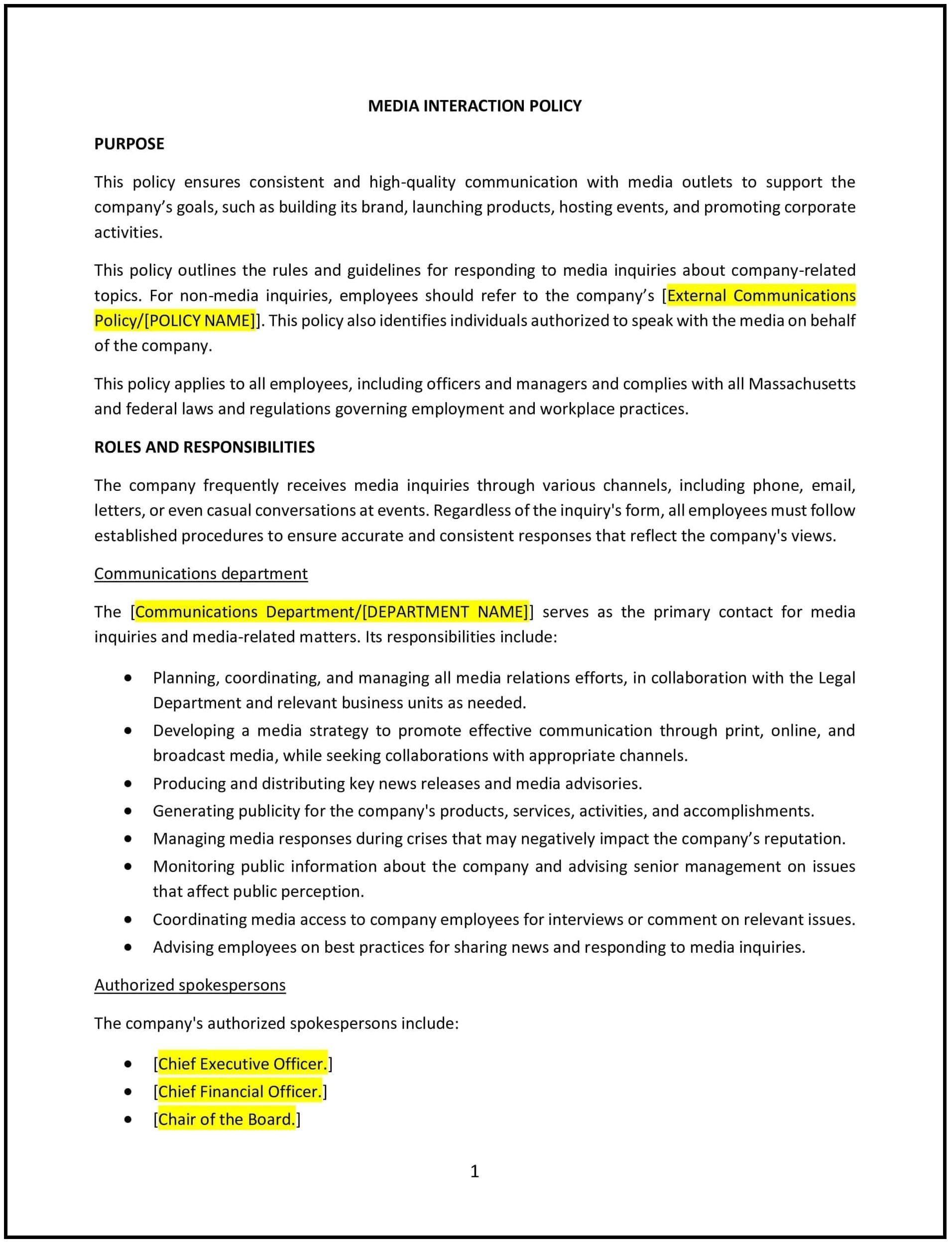Media relations policy (Massachusetts): Free template
Got contracts to review? While you're here for policies, let Cobrief make contract review effortless—start your free review now.

Customize this template for free
This media relations policy is designed to help Massachusetts businesses establish clear guidelines for managing communication with the media. The policy outlines the roles and responsibilities of employees in handling media inquiries, the process for issuing public statements, and the company’s approach to ensuring accurate and consistent communication with the press. It helps businesses protect their reputation, maintain positive media relations, and ensure that all media interactions align with company values and goals.
By adopting this policy, businesses can streamline their media communication, maintain consistency in messaging, and reduce the risk of reputational damage caused by miscommunications or unauthorized statements.
How to use this media relations policy (Massachusetts)
- Define media interactions: Specify the types of media interactions covered by the policy, such as press releases, media interviews, and responding to press inquiries. The policy should clarify who is authorized to speak with the media and under what circumstances.
- Establish designated spokespersons: Identify the individuals authorized to interact with the media on behalf of the company, such as senior executives, PR staff, or designated spokespersons. The policy should specify how these spokespersons are selected and trained to handle media inquiries.
- Outline the process for responding to media inquiries: Provide clear guidelines for how employees should handle media inquiries. Employees should be instructed to redirect any media inquiries to the designated spokesperson or PR team. The policy should also outline the procedure for gathering relevant information, preparing responses, and ensuring accuracy before speaking with the media.
- Address proactive media engagement: Outline the company’s approach to proactively engaging with the media, including issuing press releases, organizing press conferences, and sharing company news with journalists. The policy should specify how to craft and distribute messages that align with company values and objectives.
- Promote consistency in messaging: Emphasize the importance of maintaining consistency in messaging across all media channels. The policy should specify that any media communications must align with the company’s core messaging, mission, and brand voice.
- Protect confidential and sensitive information: Include guidelines for safeguarding confidential or proprietary information during media interactions. The policy should instruct employees not to disclose any sensitive company data, financial information, or other confidential materials without proper authorization.
- Ensure compliance with Massachusetts and federal laws: Ensure that all media relations practices comply with Massachusetts state laws and federal regulations, including those related to privacy, defamation, and advertising standards. The policy should also cover any industry-specific guidelines or ethical considerations.
- Review and update regularly: Periodically review and update the policy to ensure it remains relevant, effective, and compliant with changes in media landscape or regulatory requirements.
Benefits of using this media relations policy (Massachusetts)
This policy offers several benefits for Massachusetts businesses:
- Promotes consistent and accurate communication: By standardizing how the company communicates with the media, businesses can ensure that their messages are consistent, accurate, and aligned with company goals.
- Protects company reputation: Clear guidelines for media interactions help businesses protect their reputation by preventing miscommunication, unauthorized statements, or the spread of misinformation.
- Reduces legal risks: By ensuring that media communications comply with Massachusetts state laws and federal regulations, businesses can reduce the risk of legal challenges or liability related to press coverage.
- Enhances media relationships: Proactively managing media interactions and providing timely, accurate information helps build and maintain positive relationships with journalists and media outlets.
- Increases transparency: The policy promotes transparency by ensuring that all media interactions are based on factual information and company-approved statements, helping to build trust with the public and stakeholders.
- Improves crisis management: In the event of a crisis, having a clear media relations policy in place allows businesses to respond quickly and effectively, managing the narrative and mitigating potential damage.
Tips for using this media relations policy (Massachusetts)
- Communicate the policy clearly: Ensure that all employees understand the media relations policy and know who to contact in case of a media inquiry. This can be communicated through employee handbooks, internal communications, and training sessions.
- Provide training for spokespersons: Train designated spokespersons on how to handle media inquiries, craft effective messages, and manage interviews. Spokespersons should also be trained on handling difficult questions or sensitive issues.
- Monitor media coverage: Regularly monitor media coverage to track how the company is being portrayed in the press. This will help identify any potential issues or opportunities to engage with the media proactively.
- Maintain a media contact list: Keep an up-to-date list of key media contacts, including journalists, editors, and PR representatives. This list should be easily accessible to the designated spokespersons or PR team.
- Be prepared for crises: In case of a crisis or emergency, have a plan in place for managing media relations, including a crisis communication team and pre-prepared statements to address potential issues quickly.
- Review and update regularly: Periodically review the policy to ensure it reflects changes in the media landscape, company operations, or legal regulations. Updates should be communicated to all employees involved in media relations.